Posts Tagged ‘Sliema’
-
THE SELLING GAME
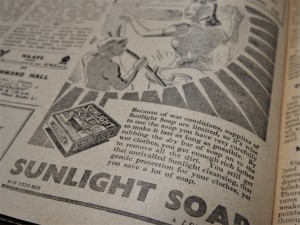 Advertising is said to reflect the societal tastes, beliefs and norms. By looking back at the adverts that were published in the Times of Malta at the end of the years 1939 to 1944, this becomes very clear. Yet even their absence during the days of war have much to say.
Advertising is said to reflect the societal tastes, beliefs and norms. By looking back at the adverts that were published in the Times of Malta at the end of the years 1939 to 1944, this becomes very clear. Yet even their absence during the days of war have much to say.There are whole studies and much research behind advertising. Adverts are used as a form of communication intended to convince an audience to purchase or take some action upon products, ideals or services. Their regularity aim to impact on memory to create a sense of familiarity and trust to buy those products.
Indeed, while turning the pages of November – December 1939 and 1940 of the Times of Malta, it is evident that a group of particular brands are always featuring. Most relate to health, beauty, alcohol, insurance, entertainment (mainly cinema), fashion and gifts.
Health adverts at the time generally focus on irritability of the stomach, laxatives, cold and fever, rheumatism, eczema, fatigue and sleeplessness. The message on the adverts is mainly delivered through drawings and long descriptions about the benefits of using the products.
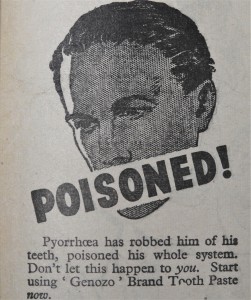 The text is generally presented in the form of a conversation – “Why continue to be agonised by Terrible Headaches, Niggling Nerve Pains, Black Depression, and Heavy-Limbed Lassitude?” – reads the introduction of an advert for tonic tablets.
The text is generally presented in the form of a conversation – “Why continue to be agonised by Terrible Headaches, Niggling Nerve Pains, Black Depression, and Heavy-Limbed Lassitude?” – reads the introduction of an advert for tonic tablets.“Do you realise the danger? Impure blood causes disease.” – says another advert selling a ‘blood mixture’ as ailment against rheumatism, lumbago, eczema, boils and pimples.
Communication with the readers is stark and direct – The word “Poisoned!” in capital black letters runs over the mouth of a man in the advert of a toothpaste. “Pyorrhoea has robbed him of his teeth, poisoned his whole system. Don’t let this happen to you.”
“Is running a house too much for you?” reads the title of an energy drink. “Do you feel that the cares of the household get you down and managing your servants is a strain?”
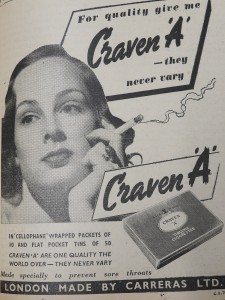 The quantity of adverts focusing on health issues form quite a big chunk of the advertising at the time. However, ironically, these are accompanied by cigarette adverts, one of which shows a beautiful young woman with a cigarette in her hand. A section of the advert text reads – “Made specially to prevent sore throats.”
The quantity of adverts focusing on health issues form quite a big chunk of the advertising at the time. However, ironically, these are accompanied by cigarette adverts, one of which shows a beautiful young woman with a cigarette in her hand. A section of the advert text reads – “Made specially to prevent sore throats.”Some of the adverts published at the time will certainly be unacceptable nowadays. Social class differences, sexism and offensive messages are quite typical.
“Women who belong to the 1st sleep group never grow old before their time. There are 3 groups. Which do you belong to?” – asks an advert selling Horlicks. “Most attractive women belong to the 1st sleep group.” – states another one. “Men who are sure of themselves belong to the 1st sleep group.” – and – “Men who get on in life nearly all belong to the 1st sleep group”.
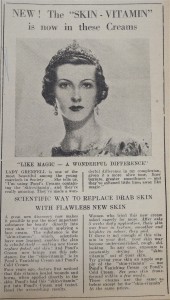 “Don’t look old! Tint those grey hairs with Shadeine.” – jumps at you an advert selling hair colour.
“Don’t look old! Tint those grey hairs with Shadeine.” – jumps at you an advert selling hair colour.Advertisements can influence strongly how we perceive things around us. By showing a high social class user of a product, the advert creates a longing or a pressure to purchase that item in order to belong to that level of society.
A skin-vitamin cream portrays the drawing of a beautiful lady, all dressed up in perfect make-up, set-up hair, a pair of lovely earrings and a crown. – “Lady Grenfell is one of the most beautiful among the young marrieds in Society…. She tells us, ‘I’m using Pond’s Creams containing the ‘skin-vitamin’, and they’re really amazing.”
“Many army and royal navy officers enjoy the comfort of our hand-made footwear. Why Not you? Sir.” – entices an advert showing the drawing of a highly elegant man sitting in a luxurious armchair while a shoe-maker sits on a stool to help him try on a new pair of shiny “Best English leather”.
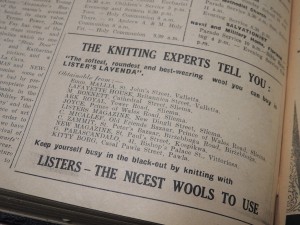 A shade of the effects of the Second World War, even though not yet happening in Malta is already present in adverts of 1939.
A shade of the effects of the Second World War, even though not yet happening in Malta is already present in adverts of 1939.“Keep yourself busy in the black-out by knitting with Listers – the nicest wool to use.” – advices an advert. “Bernards suggest that you give sensible gifts this Christmas. Such gifts as shirts, pyjamas, handkerchiefs, ties, socks, gloves and wool-slipovers all make very acceptable presents.” – recommends another one.
Not only adverts diminish in 1941 during the war days in Malta. Even the newspaper itself shrivels to a few pages although being published daily.
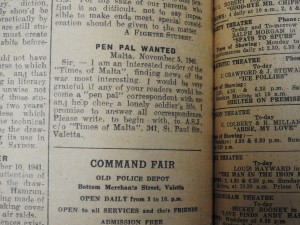 “Test your gas mask. Gas Chamber at Castile Place today.” – reads a warning advert on the front page of the Times of Malta on Tuesday, November 4, 1941. “There is no better way of ensuring that the respirator is still properly functioning than by putting it on and entering the gas chamber.”
“Test your gas mask. Gas Chamber at Castile Place today.” – reads a warning advert on the front page of the Times of Malta on Tuesday, November 4, 1941. “There is no better way of ensuring that the respirator is still properly functioning than by putting it on and entering the gas chamber.”Amid the difficulties of war, an advert speaks out the request for a pen pal – “I am an interested reader of the “Times of Malta”, finding news of the war most interesting. I would be very grateful if any of your readers would become a “pen pal” correspondent with me and help cheer a lonely soldier’s life.”
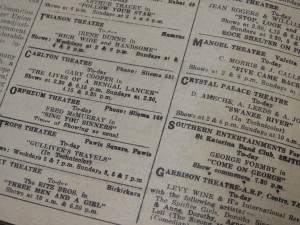 A considerable decrease of adverts continues in 1942. Alcohol adverts drop out completely. Cinema continues regularly in the following theatres – Manoel and Coliseum in Valletta, Gaiety, Majestic, Carlton and Orpheum in Sliema, Odeon, Thrianon and Rex in Ħamrun, Prince in Birkirkara, Buckingham and Royal in Żabbar, and Empire in Paola.
A considerable decrease of adverts continues in 1942. Alcohol adverts drop out completely. Cinema continues regularly in the following theatres – Manoel and Coliseum in Valletta, Gaiety, Majestic, Carlton and Orpheum in Sliema, Odeon, Thrianon and Rex in Ħamrun, Prince in Birkirkara, Buckingham and Royal in Żabbar, and Empire in Paola.“What do I do…. about the black market?” runs an advert issued by the Information Office. A Wartime Reminder advert issued by the same Office reminds people that “Imported Fuel is used for pumping Water. Reduced consumption of water saves Fuel. A saving in Fuel saves Freight, (and) Saving in freight helps to win the War.”
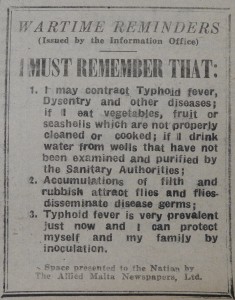 Another Wartime Reminder recommends the adequate washing of vegetables, fruit and seashells, and their proper cooking while warning against the accumulation of filth, since these may lead to Typhoid fever and Dysentry. Inoculation against the Typhoid fever is also advocated.
Another Wartime Reminder recommends the adequate washing of vegetables, fruit and seashells, and their proper cooking while warning against the accumulation of filth, since these may lead to Typhoid fever and Dysentry. Inoculation against the Typhoid fever is also advocated.The siege on the Maltese Islands effectively ended in November 1942. Yet adverts show that life took time to return to normal especially since the Second World War had not yet ended in other countries.
An advert issued by the N.F.U advices to eat cabbage and cauliflower to keep fit. Another advert informs its clientele that “Because of war conditions, supplies of Sunlight Soap are limited, so it’s wise to use the soap you have very carefully to make it last as long as possible.”
Even tennis balls were restored instead of purchasing new ones – “Hand in your old Tennis Balls to any of the Sports Dealers named below, who will forward them to Slazengers for renovation by a special process which includes reinflation and provision of a new outside cover.”
During the days of war, a few selected companies such as Bovril, managed to stay in the public eye through advertisements. “Makes all the difference between bread and butter.” The Bovril advert states. “A 4-oz. Bottle of Bovril makes over 100 delicious sandwiches.”
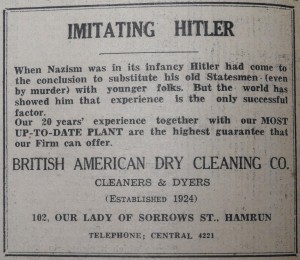 Other adverts such as the one for Dettol portrayed the company’s involvement in the war efforts and reminded that the product should be used with “measured care” in order to keep the supply flowing.
Other adverts such as the one for Dettol portrayed the company’s involvement in the war efforts and reminded that the product should be used with “measured care” in order to keep the supply flowing.Marketers have always adapted to changing business demands when it comes to creating new advertisements. However, there are moments when their creativity is quite shocking – “Imitating Hitler” screams the title in bold capital letters of the British American Dry Cleaning Co.
(This feature was published in the Christmas Supplement issued with the Times of Malta dated 1st December 2019)
-
CORNER COMFORTS
 “You wouldn’t survive in this business if you are not brought up in it since childhood. It is just too demanding and it takes up your life completely,” insisted Frankie Cutajar, the owner of Lady Di Pub in Tignè Street, Sliema.
“You wouldn’t survive in this business if you are not brought up in it since childhood. It is just too demanding and it takes up your life completely,” insisted Frankie Cutajar, the owner of Lady Di Pub in Tignè Street, Sliema.“On the other hand, if the seed of entertainment has been nurtured in your blood from an early age, it is difficult to let go of such an engaging and colourful world,” he said as he laughed heartily and poured a tin of golden beer into a large glass for a client.
Cutajar hails from Valletta. Two of his family members are the renowned late musician Oscar Lucas and popular singer Joe Cutajar.
“Back in the old days, their cheerful attitude and exquisite talent used to light up the thrilling atmosphere of Strait Street. I can still remember the time when 10,000 foreign soldiers sought that area in Valletta each week and all those who had a business there, concocted new ways to attract them to their locale.”
“My uncle Oscar Lucas played in various venues. Together with Jimmy Grech (also known as Jimmy l-Irish), he owned the Las Vegas which was the first nightclub to open in Malta and boasted a capacity of 500 seats. It was huge, running from the area where today one finds the Marks and Spencer store and going up to the Embassy. At the age of 12, I worked as a commis waiter in this nightclub, serving customers which were mainly young couples, between 6:00pm and 8:00pm.”
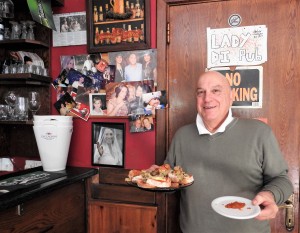 Cutajar got married when he was 18 and kept working at Las Vegas until it closed its doors.
Cutajar got married when he was 18 and kept working at Las Vegas until it closed its doors.“The British Forces’ departure from our islands drained all the energy from Strait Street, turning it into a shadow of what it was. Paceville became the new attraction for the younger generation while Valletta died out during the evenings. Eventually, Jimmy l-Irish, my older brother Harry and I acquired a bar in Melita Street and called it Pippo’s.”
“Later on, my brother and I also took over a business in Tignè Street, Sliema. This place was originally a bar known as Neriku and it was run by my grandfather and grandmother. After it served as an antique shop for some years, we decided to open it as a pub. Many of the visitors who came to Malta and stayed at the surrounding hotels in Sliema were British. So we had no doubts whatsoever about what we were going to name our new pub.”
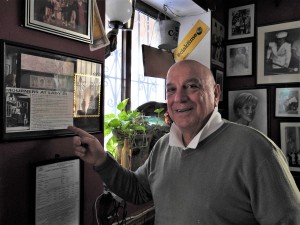 A framed copy of a newspaper feature which hangs on one of the walls narrates how the name Lady Di Pub came to life. Cutajar recounted this incident proudly.
A framed copy of a newspaper feature which hangs on one of the walls narrates how the name Lady Di Pub came to life. Cutajar recounted this incident proudly.“I was having a meal with a well-connected friend of mine at a London restaurant when he introduced me to Lady Diana. I told her that I would be naming a bar after her to record the memorable event of her marriage to Prince Charles. Shortly afterwards, I saw her again at a film premiere in Leicester Square and she reminded me about it.”
Lady Di Pub opened its doors right on Wednesday, 29 July 1981; the day of the eventful fairytale wedding.
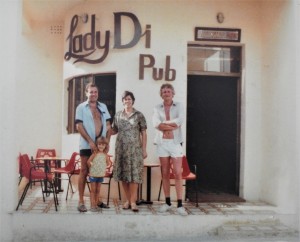 “This is how the pub looked at the time,” Cutajar said as he pointed at another old photo. “It consisted of just two small rooms. However, it had a very good clientele.”
“This is how the pub looked at the time,” Cutajar said as he pointed at another old photo. “It consisted of just two small rooms. However, it had a very good clientele.”Meanwhile, Pippo’s bar in Valletta was turned into Da Pippo’s restaurant and his brother Harry stayed to manage it. Frankie opted to run the pub in Sliema. In 2006, the Lady Di Pub was rebuilt after the property was earmarked for development and was demolished.
“Although the pub was new, I decided to recreate its old British soul. I knew that my clients would appreciate the warm feeling of a unique traditional corner huddled amongst the tall and modern buildings.”
In recent years, Sliema’s architectural context has changed considerably. Huge, inanimate buildings are replacing traditional stately homes, a small number of which still survive in Tignè Street.
“Times change and people have to move on with the progress which is generated. Sliema is not Valletta. Whereas Valletta is a historical city of culture, Sliema is a business hub and a touristic area. The more modernized it is, the more people it attracts, and the more customers will come to this pub,” Cutajar stated as he winked playfully.
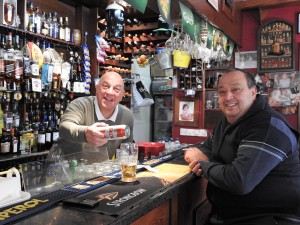 “His charismatic character and that of his son Keith who also works here are the secret of the success of this place,” revealed Ġanni Fenech, a regular client who was having a beer at the bar. “They have a way of making everyone feel welcome and they are also very good in the kitchen. The appetizers in this bar are always bountiful and delicious, urging you to keep on drinking so that the food continues to come out. Seasoned bread, pasta, ricotta and pea pies, cheesecakes… They simply taste like heaven with a glass of beer.”
“His charismatic character and that of his son Keith who also works here are the secret of the success of this place,” revealed Ġanni Fenech, a regular client who was having a beer at the bar. “They have a way of making everyone feel welcome and they are also very good in the kitchen. The appetizers in this bar are always bountiful and delicious, urging you to keep on drinking so that the food continues to come out. Seasoned bread, pasta, ricotta and pea pies, cheesecakes… They simply taste like heaven with a glass of beer.”Right on the point, Frankie came out of the kitchen with a plate of thickly sliced crusty Maltese bread spread with kunserva, a sweet tomato paste, and topped with olives, onions, lettuce and broad beans.
“Especially on Fridays and during weekends, Lady Di Pub is full of people and it stays open until the early morning hours. Some of our clients work in the nearby offices and come here to end the week in a good mood and meet friends. A number of others are regulars from Sliema including a small group of elderly people who have been gathering here each Sunday for the past 30 years! Other locals come from various areas around Malta. However, the majority of our clients are foreigners.”
Frankie starts his day at around 8:30am by doing errands, including buying fresh bread. After enjoying a coffee at a nearby coffee shop, he opens his pub at 10:00am. Soon, the first clients will come in and he starts preparing some inviting appetizers. By now, his long experience and a good knowledge of his clientele have furnished him with an invaluable insight of who will be calling at his pub on each day and what he will need to prepare.
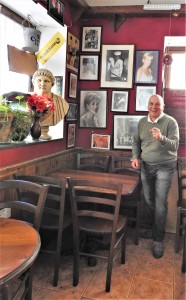 “We are here to make our clients feel comfortable. Should they wish to have lunch or dinner, we can cook anything to their liking, once they advise us beforehand. Last week, we cooked a selection of pasta, fried rabbit and rib-eye steak for a group, and they surely loved it!”
“We are here to make our clients feel comfortable. Should they wish to have lunch or dinner, we can cook anything to their liking, once they advise us beforehand. Last week, we cooked a selection of pasta, fried rabbit and rib-eye steak for a group, and they surely loved it!”Whilst the younger generation prefer to seek out Keith’s company, the older clientele feels closer to Frankie.
“I am 67 now but still going strong,” Frankie joked as he turned to a laptop and turned on some music. “Back in Valletta, we enjoyed live music at our nightclub. Until some years ago, I had a juke box here. Now I have to rely on this new technology. Flexibility is a must in such a business. Nowadays clients demand to hear particular songs while having a drink and this is the most practical way.”
Culture change is also evident in the choice of requested alcohol and in the clientele’s attitude.
“In the past, people preferred whisky especially Jack Daniels. We also served gin and vodka. Today, very few will ask for gin or vodka and the whisky which we sell is mainly J & B, Jameson, and Johnny Walker Black. Earlier generations used to come in and offer drinks to friends and to other people in the pub. We also had incidents when people got heavily drunk and still insisted to have more drinks. The present generation will generally order and pay for their own drinks, whether male or female. They are also more aware of the risks of over-drinking and they rarely get drunk.”
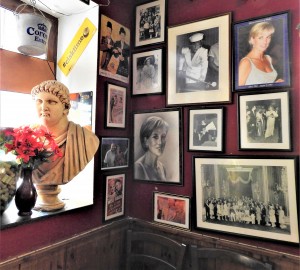 Several framed photos of Lady Diana keep a watchful eye over the pub’s customers.
Several framed photos of Lady Diana keep a watchful eye over the pub’s customers.“These were given to us by her photographer who became our friend,” Frankie explained. “Customers love to look at them especially now that she’s gone. She was very cherished by the people and they still miss her terribly.”
After her tragic death on 31 August 1997, Lady Diana’s fans were distraught. They frantically searched for anything which connected them to her.
“For a number of days after her demise, people left flowers at our doors as a sign of mourning. A British journalist for The People came to visit the pub and interviewed me about this experience. It was certainly a very disturbing loss but in this little corner in Malta, Lady Di’s memory is still very much alive.”
(This feature was published in SLIEMA TIMES – APRIL 2018 issued with The Times of Malta)
Travelogue
Archives
| M | T | W | T | F | S | S |
|---|---|---|---|---|---|---|
| « Jan | ||||||
| 1 | 2 | 3 | 4 | 5 | 6 | 7 |
| 8 | 9 | 10 | 11 | 12 | 13 | 14 |
| 15 | 16 | 17 | 18 | 19 | 20 | 21 |
| 22 | 23 | 24 | 25 | 26 | 27 | 28 |
| 29 | 30 | 31 | ||||
Recent Posts
- A MATTER OF FATE
- MALTA’S PREHISTORIC TREASURES
- THE MAGIC IS IN THE DETAIL
- THE SELLING GAME
- NEVER FORGOTTEN
- Ġrajjiet mhux mitmuma – 35 sena mit-Traġedja tal-Patrol Boat C23
- AN UNEXPECTED VISIT
- THE SISTERS OF THE CRIB
Comments
- Pauline Harkins on Novella – Li kieku stajt!
- admin on IL-KARNIVAL TRAĠIKU TAL-1823
- Albert on IL-KARNIVAL TRAĠIKU TAL-1823
- Martin Ratcliffe on Love in the time of war
- admin on 24 SENA ILU: IT-TRAĠEDJA TAL-PATROL BOAT C23